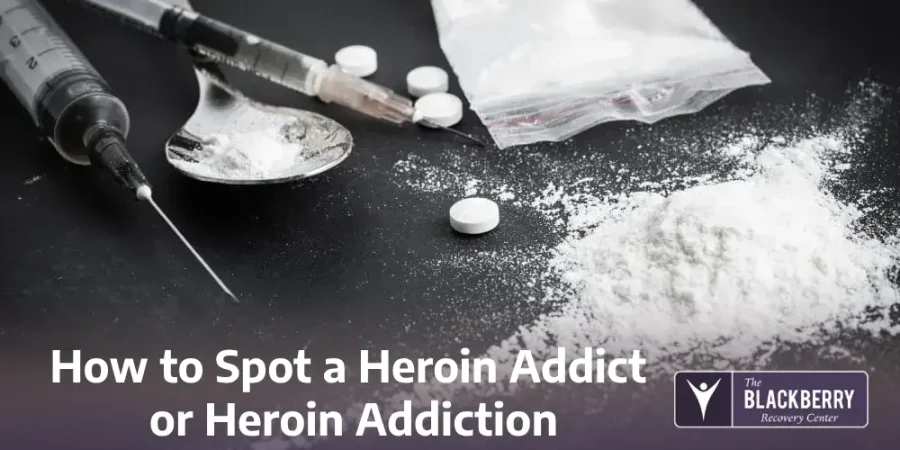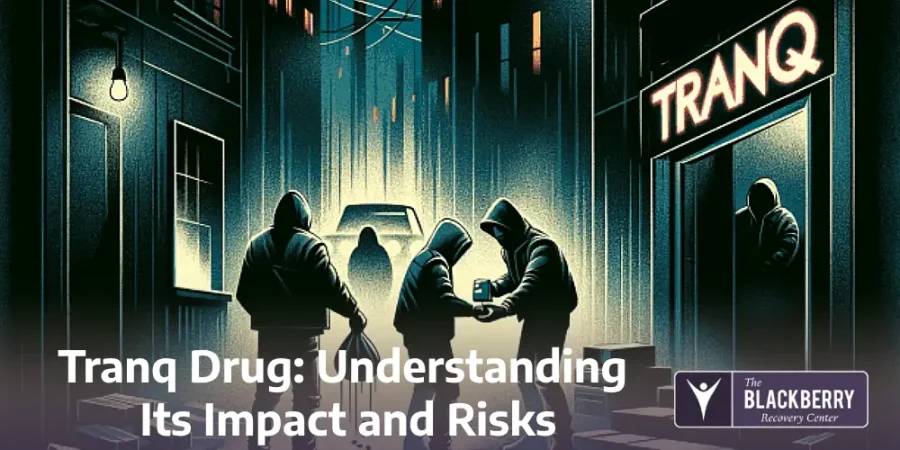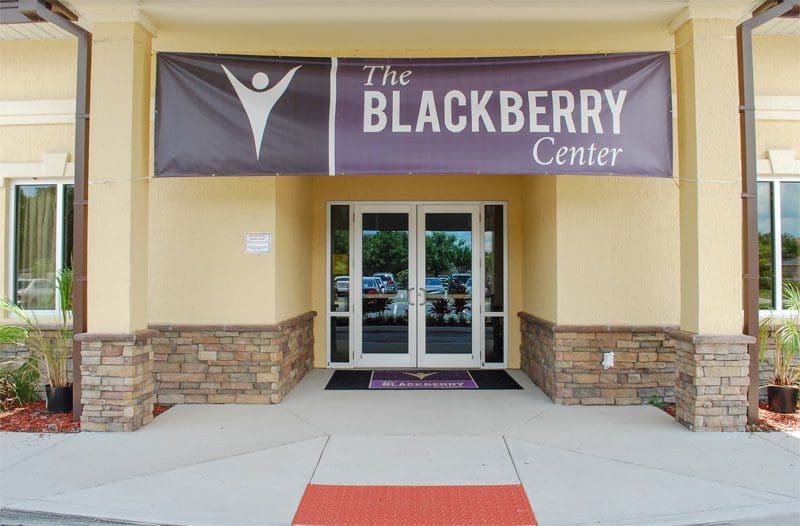If you’re concerned that someone you know might be a heroin addict, or if you’re seeking information to better understand the complexities of heroin addiction, you’ve come to the right place.
Heroin addiction is a severe and often misunderstood issue, affecting individuals and communities on multiple levels. Recognizing the signs early on is crucial for intervention and long-term recovery.
This comprehensive guide aims to provide you with in-depth information on what heroin is, how to spot the signs of a heroin addict, the intricacies of dual diagnosis, and the crucial steps involved in heroin detox and rehab.
Whether you’re dealing with this issue personally or are concerned for someone else, knowledge is the first step toward making a meaningful change.
If you are ready to take a step now, reach out to The Blackberry Center’s admissions specialists at (813) 908-4199 or fill out our confidential contact form.
What is Heroin?

How to Spot a Heroin Addict or Heroin Addiction
Understanding what heroin is, is the cornerstone of comprehending its addictive nature, the high-risk factors associated with its use, and why it’s crucial to spot signs of heroin addiction early on. This section aims to provide an in-depth look into what heroin is, its various forms, how it’s consumed, and its classification as a drug.
Heroin Definition
Heroin, chemically known as diacetylmorphine, is an illegal drug synthesized from morphine, a naturally occurring substance extracted from the seed pods of certain varieties of poppy plants. It was initially created to serve as a less addictive alternative to morphine but quickly proved to be even more addictive and dangerous. In the United States, heroin is classified as a Schedule I controlled substance, which is meant to include drugs with a high potential for abuse and has no accepted medical use.
Methods of Heroin Consumption
Understanding the methods of heroin consumption is vital for both users and their loved ones. Heroin can be ingested in multiple ways, each with its own set of risks:
- Snorting: In this method, powdered heroin is inhaled through the nose. This can lead to respiratory issues and damage to the mucous membrane.
- Smoking: Also known as “chasing the dragon,” this involves inhaling the vapors produced when heroin is heated. This method poses a risk of lung issues including bronchitis and emphysema.
- Injecting: This is the most dangerous method where heroin is injected directly into the bloodstream. This can lead to immediate overdose and increases the risk of contracting diseases like HIV and Hepatitis C.
Common Street Names for Heroin
Recognizing the various street names for heroin can be instrumental in identifying its use. Some of the common aliases include “China White,” “H,” “Junk,” “Skag,” and “Smack.” These names are often used to discreetly discuss the drug and can vary by region.
Additionally, combinations of heroin and other controlled substances carry their own street names. “Dynamite” is slang for heroin and cocaine, while “chocolate bars” denote heroin and Xanax (Alprazolam). Other combos include “screwball” (heroin and meth,) and “El Diablo” (heroin, cocaine, and marijuana). Needless to say, hearing a loved one or potential addict use these terms could indicate an even bigger concern.
What is Black Tar Heroin?
Black Tar Heroin is a specific type of heroin that appears as a dark, sticky substance resembling roofing tar or hard coal. Predominantly produced in Mexico, this form of heroin is most commonly found in the western United States. While less pure than other forms, it is equally dangerous and addictive.
What is Gas Station Heroin?
Gas Station Heroin isn’t actually heroin; it’s a colloquial term used to describe synthetic opioids that are sometimes sold over the counter at convenience stores or gas stations. These substances can mimic the effects of heroin and can be just as dangerous, leading to addiction or overdose.
What Type of Drug is Heroin?
Understanding the classification of heroin is crucial for grasping its effects on the human body:
Is Heroin a Narcotic?
In both legal and medical terms, heroin is considered a narcotic. Narcotics are drugs that relieve pain, induce sleep, and can lead to addiction.
Is Heroin an Opiate?
Heroin is indeed an opiate, derived from the naturally occurring morphine found in the opium poppy. Opiates are known for their pain-relieving properties but are also highly addictive.
Is Heroin a Stimulant?
Contrary to some misconceptions, heroin is not a stimulant. It is a depressant, which means it slows down the central nervous system, leading to slowed breathing, heart rate, and cognitive function.
How Long Does Heroin Stay in Your System?
The duration heroin stays in one’s system can vary based on several factors, such as metabolism, frequency of use, and the method of consumption. Generally, heroin can be detected in urine for up to 7 days, in blood for up to 6 hours, and in hair for up to 90 days. Knowing this information is crucial for anyone considering detox.
Heroin Addict Symptoms: Recognizing the Signs

How to Spot a Heroin Addict or Heroin Addiction – Blackberry
Recognizing the symptoms and signs of heroin use is a critical first step in helping someone who may be struggling with addiction. The symptoms are manifold, affecting users both physically and psychologically, and extending its impact to friends, family, and even communities.
Understanding these signs in depth can facilitate early intervention, offering the individual a better chance at a successful recovery. This section aims to give you an exhaustive look at the physical, behavioral, and psychological symptoms, as well as the long-term effects of heroin use.
Signs of Heroin Use
Understanding the signs of heroin use is essential for both individual users and their concerned family and friends. These signs can manifest physically and behaviorally, and while one isolated symptom might not definitively point to heroin use, a combination of these signs should serve as a red flag warranting further investigation.
Physical Symptoms of Heroin Use
Heroin Eyes
One of the most visible physical symptoms is the change in the user’s eyes. Heroin use often leads to bloodshot eyes and contracted pupils, commonly known as “pinpoint pupils.” These changes are immediate and can last for several hours following drug use.
Heroin Track Marks
Track marks are visible puncture wounds on the skin where heroin has been injected. These marks are most commonly found on the arms but can appear anywhere on the body where a vein is accessible. Over time, these marks can become infected and lead to abscesses or other serious skin conditions.
Behavioral Symptoms of Heroin Use
Heroin doesn’t just affect users physically; it also leads to noticeable changes in behavior. These behavioral symptoms can sometimes be more subtle but are generally apparent to those familiar with the individual. Symptoms may include:
- Sudden mood swings ranging from euphoria to intense irritability
- Social withdrawal or a significant change in social circles
- Neglect of personal responsibilities, including work, school, and family obligations
- Unexplained financial difficulties or missing valuables, as maintaining a heroin habit can be expensive
How Long Does a Heroin High Last?
The effects of heroin can be felt almost immediately after use, depending on the method of ingestion. Snorting or smoking heroin generally produces a high that can last for approximately 15 to 30 minutes, while injecting it can produce a more potent high that may last for several hours. However, the drug itself can remain in the system for much longer, affecting both physical and cognitive functions.
Heroin’s Effects on the Brain
Understanding how heroin impacts the brain is crucial for grasping its addictive nature and long-term effects. Heroin targets the brain’s reward system by flooding it with dopamine, a neurotransmitter associated with pleasure, reward, and motivation. This flood of dopamine is what produces the euphoric “high” associated with heroin use. Over time, the brain becomes reliant on heroin to feel pleasure and its natural ability to produce dopamine is diminished, leading to emotional and psychological dependence.
Recognizing Heroin Overdose Symptoms
An overdose is a life-threatening condition that requires immediate medical intervention. The signs of a heroin overdose can include but are not limited to:
- Extremely shallow breathing or complete cessation of breath
- Blue lips and fingernails indicating lack of oxygen
- Disorientation or delirium
- Seizures or muscle spasms
- Unresponsiveness or loss of consciousness
Heroin Addict Withdrawal Symptoms
Withdrawal from heroin is an agonizing experience, both physically and emotionally. Symptoms can include severe nausea, vomiting, intense sweating, and debilitating muscle aches and spasms. These can start as soon as six hours after the last dose and can persist for up to a week or more, depending on the severity of the addiction.
Dual Diagnosis: A Crucial Element in Treating a Heroin Addict
When it comes to heroin addiction, it’s often not an isolated issue. Many individuals struggling with heroin use also face co-occurring mental health disorders like depression, anxiety, or PTSD. This complex interplay between mental health and addiction can make treatment more challenging, which is why a specialized approach is needed.
At The Blackberry Center, we offer a Dual Diagnosis program tailored to treat both the substance abuse and the underlying mental health conditions. Our compassionate team of clinicians use evidence-based treatments to address both aspects, understanding that one often exacerbates the other. Treatment modalities range from psychiatric assessments and medical detox to personalized medication management and group therapy.
For more details on how The Blackberry Center can aid in treating co-occurring disorders and heroin addiction, read the upcoming section “The Blackberry Center Approach.”
Long-Term Consequences of Heroin Use
Chronic heroin use leads to a host of long-term health consequences. These can range from respiratory complications, liver and kidney diseases, to severe mental health issues including increased risk of depression and anxiety disorders. Additionally, long-term heroin use can lead to social consequences like job loss, broken relationships, and even legal troubles.
Heroin Detox and Heroin Rehab: The Path to Recovery

How to Spot a Heroin Addict or Heroin Addiction – Blackberry Hospital
Navigating the road to recovery from heroin addiction is a multi-faceted process that involves both detoxification (detox) and long-term rehabilitation (rehab). This section aims to provide a comprehensive look at what each of these phases entails and why they are crucial steps in the journey towards sobriety and mental well-being.
Why Heroin Detox and Heroin Rehab is Important
The first and perhaps most critical step in treating heroin addiction is detoxification. Detox involves the removal of heroin and other toxins from the body, preparing it for the long-term treatment that rehab provides. However, detox alone is not enough for sustainable recovery. This is where heroin rehab comes in, offering a structured environment and a range of treatments to address the root causes of addiction, be they psychological, social, or behavioral.
Phases of Heroin Detox
Heroin detox usually occurs in several phases:
- Evaluation: An initial medical assessment to determine the level of heroin in the system and any co-occurring disorders or medical conditions.
- Stabilization: Medical and psychological support is provided to help manage withdrawal symptoms and cravings.
- Transition to Rehab: After detox, the individual is prepared for the next stage of treatment: rehabilitation.
Each of these phases is critical for the detox process to be effective and to set the stage for long-term recovery.
Medications Used in Heroin Detox and Rehab
Various medications can be used to manage withdrawal symptoms and cravings, including Methadone, Buprenorphine, and Naltrexone. These medications are often used in combination with counseling and other behavioral therapies.
The Blackberry Center Approach
The Blackberry Center’s dual diagnosis program is designed for individuals aged 18 and older who are grappling with both substance abuse, such as heroin addiction, and co-occurring mental health issues. Given the destructive interplay between mental illness and addiction, this specialized level of care is crucial for long-term recovery. The program is offered in both inpatient and partial hospitalization settings, providing comprehensive treatment in a serene, retreat-like environment.
The Dual Diagnosis Difference at The Blackberry Center
Our clinical care staff at The Blackberry Center administer compassionate and respectful care to adults suffering from co-occurring substance use disorders and mental health issues. This is especially pertinent as individuals addicted to substances like heroin are often more likely to develop mental illnesses and vice versa.
If left untreated, these conditions exacerbate each other, significantly diminishing your quality of life. That’s where our team of doctors, psychiatrists, nurses, and other clinical staff step in. Using proven, evidence-based treatment modalities, we help patients in the central Florida area achieve full recoveries. Our approach is holistic, treating both issues simultaneously to address their dangerous interconnection, and we offer support throughout the entire recovery process.
Dual Diagnosis Treatment Modalities at The Blackberry Center
- Psychiatric Assessment: An initial one-on-one consultation with an experienced mental health professional to discuss your mental health and treatment goals.
- Medical Detox: If required, 24/7 monitoring by clinical staff and physician supervision during the vulnerable medical detox phase.
- Medication Evaluation and Management: Consultation to evaluate your current medications and make necessary adjustments or prescriptions.
- Group Therapy: Sessions that allow you to share your experiences and learn from others who are facing similar challenges.
- Nutritional Consultations: Personalized dietary planning to improve mental health.
- Recreational Therapy: Evidence-based treatments aimed at developing life skills for post-treatment independence.
- 12-Step Programming: A structured approach to long-term sobriety.
- Community-Based Services: Collaborations with local addiction recovery and mental health specialists to provide extended care beyond our programs.
Discharge Process at The Blackberry Center
From the day of admission, planning for discharge starts, whether it’s a return to a home environment, a halfway house, or long-term treatment. Our social workers and treatment team ensure a safe and seamless transition to community living.
Get Help With Your Co-Occurring Disorders Today
If you or a loved one is struggling with co-occurring mental illness and heroin addiction, help is available. Contact our admissions specialists at (813) 908-4199 or use our confidential contact form to learn more about our treatment options. No matter how you choose to seek help, we are ready to listen.
Next Steps: Your Path to Recovery Starts Here
This comprehensive guide has provided you with critical information on recognizing the signs of heroin use, understanding its effects on the body and mind, and the importance of specialized treatments like dual diagnosis. But acquiring knowledge is just the first step; taking action is what truly counts.
If you’ve recognized any of the symptoms or signs mentioned in this article in yourself or someone else, it’s crucial to seek professional help immediately. Heroin addiction is a complex issue, often complicated by co-occurring mental health disorders. Specialized treatment options like those offered at The Blackberry Center can provide the comprehensive care required for long-term recovery.
Take Action Now
Don’t let another day go by without taking steps toward recovery. If you’re ready to make a change, reach out to The Blackberry Center’s admissions specialists at (813) 908-4199 or fill out our confidential contact form. Your path to a healthier, happier life is just a phone call or a click away. Make that step today.
The effects of heroin can be felt almost immediately after use, depending on the method of ingestion. Snorting or smoking heroin generally produces a high that can last for approximately 15 to 30 minutes, while injecting it can produce a more potent high that may last for several hours. However, the drug itself can remain in the system for much longer, affecting both physical and cognitive functions.
The duration heroin stays in one’s system can vary based on several factors, such as metabolism, frequency of use, and the method of consumption. Generally, heroin can be detected in urine for up to 7 days, in blood for up to 6 hours, and in hair for up to 90 days.
Contrary to some misconceptions, heroin is not a stimulant. It is a depressant, which means it slows down the central nervous system, leading to slowed breathing, heart rate, and cognitive function.
Heroin is indeed an opiate, derived from the naturally occurring morphine found in the opium poppy. Opiates are known for their pain-relieving properties but are also highly addictive.
In both legal and medical terms, heroin is considered a narcotic. Narcotics are drugs that relieve pain, induce sleep, and can lead to addiction.
Gas Station Heroin isn’t actually heroin; it’s a colloquial term used to describe synthetic opioids that are sometimes sold over the counter at convenience stores or gas stations. These substances can mimic the effects of heroin and can be just as dangerous, leading to addiction or overdose.
Black Tar Heroin is a specific type of heroin that appears as a dark, sticky substance resembling roofing tar or hard coal. Predominantly produced in Mexico, this form of heroin is most commonly found in the western United States. While less pure than other forms, it is equally dangerous and addictive.
Some of the common street names for heroin include “China White,” “H,” “Junk,” “Skag,” and “Smack.” These names are often used to discreetly discuss the drug and can vary by region.
Additionally, combinations of heroin and other controlled substances carry their own street names. “Dynamite” is slang for heroin and cocaine, while “chocolate bars” denote heroin and Xanax (Alprazolam). Other combos include “screwball” (heroin and meth,) and “El Diablo” (heroin, cocaine, and marijuana). Needless to say, hearing a loved one or potential addict use these terms could indicate an even bigger concern.
- Snorting: In this method, powdered heroin is inhaled through the nose. This can lead to respiratory issues and damage to the mucous membrane.
- Smoking: Also known as “chasing the dragon,” this involves inhaling the vapors produced when heroin is heated. This method poses a risk of lung issues including bronchitis and emphysema.
- Injecting: This is the most dangerous method where heroin is injected directly into the bloodstream. This can lead to immediate overdose and increases the risk of contracting diseases like HIV and Hepatitis C.
Heroin, chemically known as diacetylmorphine, is an illegal drug synthesized from morphine, a naturally occurring substance extracted from the seed pods of certain varieties of poppy plants. It was initially created to serve as a less addictive alternative to morphine but quickly proved to be even more addictive and dangerous. In the United States, heroin is classified as a Schedule I controlled substance, which is meant to include drugs with a high potential for abuse and has no accepted medical use.
Video
Heroin destroying lives in Kenya: trafficking to Europe fuels rising local addiction
Kenya has long been a transit country for heroin smuggled from Afghanistan to South Africa and back up towards Europe. In recent years, the drug has spilled over into some communities, fueling addiction. Story by Laurent Berstecher.
Heroin(e) Official Trailer – Netflix
In the face of the opioid epidemic in a West Virginia town, three women are giving their community a fighting chance. Heroin(e), only on Netflix September 12.
Real life stories of the tragic opiate epidemic (Heroin Education Action Team – HEAT)
Through real-life stories of the tragic consequences of opiate abuse, this video emphasizes the consequences of abuse, the devastating impact within the community, and the understanding of the emotional struggle that comes with this epidemic. While it emphasizes the dangers of opiates, this video also provides a message of hope and resources available to those struggling as a result of opiate abuse.
Podcast
Addiction in New Jersey: I’m out of f—ing hope
I’m Jay Lassiter, a former IV drug user who found the grace to amend my life. For 12 episodes of “Heroin Uncut: The Truth About the Crisis,” I’ve been sharing not only my own stories, but those of people on the frontlines of our statewide battle against addiction. It was originally my intention to end this series on a hopeful note.
FAQ
- What are the physical signs of heroin addiction?
Look for drowsiness, pinpoint pupils, needle marks, weight loss, and neglect of personal hygiene. - What behavioral changes indicate heroin use?
Changes include withdrawal from loved ones, lying, stealing, and losing interest in previously enjoyed activities. - Are there paraphernalia associated with heroin use?
Items like needles, burnt spoons, small plastic bags, or rubber bands are common. - What are the risks of untreated heroin addiction?
Risks include overdose, infections, legal issues, and long-term health problems. - How can you approach someone showing signs of heroin addiction?
Use a compassionate, non-judgmental tone and encourage seeking professional help.




